Contents
As soon as the topic and research question(s) have been determined, it is important to gain knowledge of the subject under investigation and an overview of the existing research literature. A quick internet search on Google or Wikipedia, for example, is not enough for the reasons already mentioned. In contrast, an academic search is a targeted and systematic search for relevant specialist literature. This lesson uses an example topic to show the typical steps of an academic search for secondary literature and sheet music. The search for other primary sources such as archival material is generally not yet relevant for seminar papers and bachelor theses. However, it works according to similar principles.
Three steps to researching correctly
Here are the three typical steps involved when conducting academic research:
- finding basic information
- research in musicological databases
- obtaining literature
These steps are explained below using the example topic “Form in the symphonic poems of Richard Strauss.”
(1) Finding basic information
The first starting point for any research work is overview literature, which was already presented in the previous lesson, i.e. academic specialist lexicons and handbooks.
For musicological topics, there are two standard lexicons that can now be accessed online:
- MGG online, ed. by Laurenz Lütteken, Kassel, Stuttgart, New York 2016, German language, based on Die Musik in Geschichte und Gegenwart, 2nd, new, revised edition, ed. by Ludwig Finscher, 29 vols., Kassel 1994-2008 (abbreviation: MGG2)
- Oxford Music Online, published by Oxford University Press 2001, English language, includes Grove Music Online, 2008. (successor to The New Grove Dictionary of Music and Musicians, ed. by Stanley Sadie, 29 vols., London 2001), *The New Grove Dictionary of Jazz", 2nd edition, 3 vols., 2002 and other reference works
Both lexicons require a license, but can be used with (free) library cards from the Bavarian State Library and many other universities.
In our example research, the articles “Richard Strauss,” “Symphonic Poetry” and “Form” would be helpful, as they provide us with initial background information on the subject area. In addition, lexicon articles often contain further references at the end, so that we can also gain an initial rough overview of the research literature.
In addition to lexicons, handbooks are also suitable for an initial overview. They go into more detail than lexicon articles, but are not always designed to be comprehensive and sometimes convey particular research views of the respective authors.
Handbooks exist on many different topics and deal with specific people, genres, eras, regions or research methods, for example. We will find out whether there are relevant handbooks on the respective research topics in the next research steps.
(2) Research in musicological databases
Once you have gained an initial overview with the help of scholarly lexicon articles, you now need to find relevant academic literature that will help you answer your research question. There are two ways to do this:
a) The snowball method: This involves looking through the bibliographies in the lexicon or handbook articles for relevant research texts. These texts themselves contain bibliographies that provide further references, etc. The advantage of this method is that a comprehensive bibliography is obtained quite quickly. The obvious disadvantage is that research literature that is more recent than the original lexicon article cannot be found in this way. This research method is also rather unfocused and rarely leads to complete results. We therefore recommend
b) The systematic method: This involves searching musicological literature databases. The research is much more targeted and can be better tracked afterwards, for example by keeping a research log, which documents not only the relevant literature titles, but also the search processes carried out.
The minimum requirement for musicological scholarly work is a thorough search in the musicological literature databases “Bibliographie des Musikschrifttums online” (BMS) and “RILM Abstracts of Music Literature with Full Text” (RILM).
- BMS is a continuously updated, freely accessible Internet database, in which around 500,000 individual titles are listed.
- RILM lists over 1.6 million individual titles. This is a fee-based service, but can be used free of charge with Bavarian State Library card or library cards of many other university libraries.
The following video shows where the databases and the online lexicons mentioned above can be found on the Bavarian State Library’s website in the Database Information System (DBIS). The databases can also be found in other library catalogs (see below), usually under “Other services.”
Similar to online search engines (e.g. Google), searches in the databases are carried out by entering search terms. However, as academic databases are structured differently to search engines, using search terms requires some practice and creativity.
For example, let’s open the database BMS. If we were to simply enter our example topic „Formgestaltung in den symphonischen Dichtungen von Richard Strauss“ (“Form design in the symphonic poems of Richard Strauss”), we would get zero search results:

If we enter “Richard Strauss” instead, which was very helpful in the lexicon search in step 1, we get over 2,200 search results– too many for us to evaluate properly (the lists of results for the search terms “form” or “symphonische Dichtung” would be similarly extensive):

Good search terms or combinations of terms are therefore those that are general enough to generate as many relevant search results as possible, but also specific enough not to produce too many search results. In general: The results of a search are only as good as the search terms entered!
Good search terms or combinations of terms are therefore those that are general enough to generate as many relevant search results as possible, but also specific enough not to produce too many search results. In general: The results of a search are only as good as the search terms!
- Useful search terms: Names (persons, places, etc.), titles of works, technical terms, epochs and genre designations, adjectives; capitalization does not usually matter, but singular forms are (usually) preferable to plural forms (but if in doubt, try both variants)
- Less helpful: Conjunctions (and, or, etc.), articles (the, a, etc.; in German: der, die, das, ein, eine, etc.)
- Avoid if possible: Special characters (, ; : ! ? "" @ ( ) [ ] % & etc.) as these can sometimes have special functions and influence the search result (see below)
It is also important not only to search for a specific term, but also to consider alternatives. The following images show the differences between searching for the (German) terms “Ornamentierung” and “Verzierung”:
Although both terms are often used almost synonymously, the number of search results differs enormously. It is therefore important to always search for variants and alternative terms, e.g. different spellings (symphony/sinfonie), alternative technical terms (Verzierung/Ornamentierung) or the corresponding terms in other languages (Sonate/Sonata).
What does this mean for the research on our example topic? What could a sensible combination of terms look like?
Clicking on a result in the results list opens a detailed view. This contains the so-called bibliographic information (author, title, place of publication, year of publication, page numbers, etc.) as well as additional indexing information (keywords, classification, here also summary/abstract). All this information helps to assess whether a particular search result is really relevant.
Important: Only the information entered here can be searched for in the database!
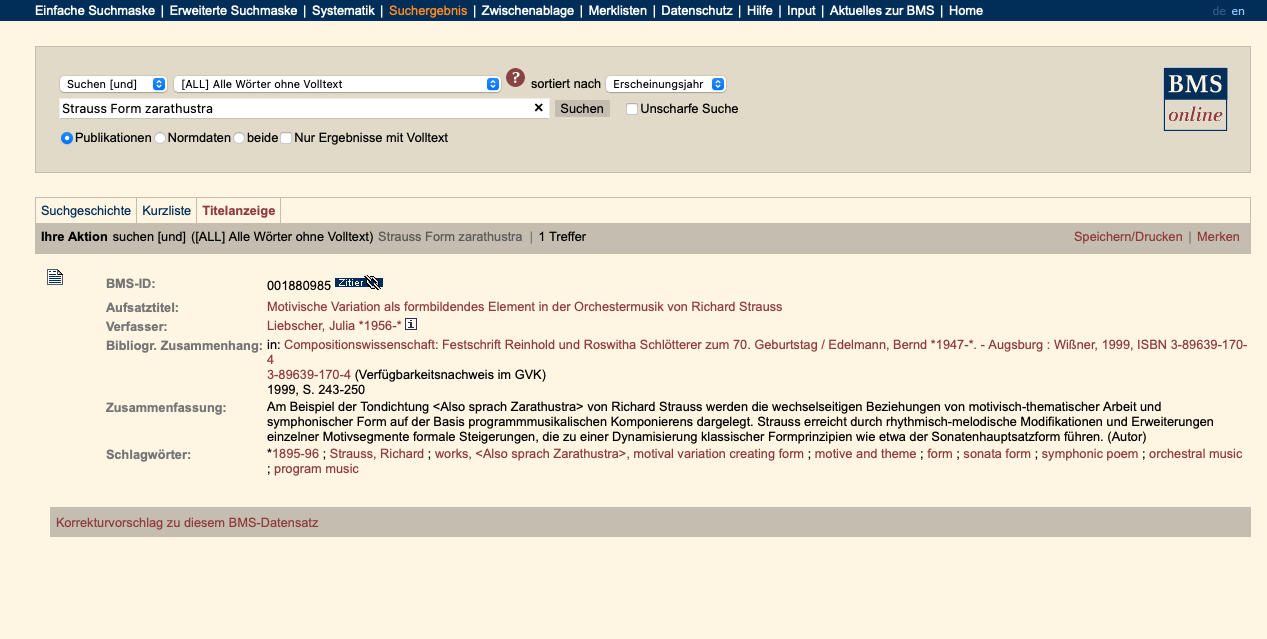
(3) Obtaining literature
Once relevant research texts have been found in the literature databases and collected in a research protocol (or a list, e.g. in a Word document), they must now be obtained for consultation. While RILM now offers an increasing number of texts for direct download, the majority of research literature exists in printed form and can be found in libraries. Thus, the next step is to check whether the literature titles found in step 2 are also available in your own university library or other libraries. For this purpose, the libraries’ OPAC (Open Public Access Catalogue) is used to search for the literature titles listed in the databank search results. The steps involved in the OPAC search are similar to those of the databank search in step 2 (no special characters, avoid conjunctions etc.). Again, the same rule applies: Only what is recorded in the OPAC can be searched for! Using the example of the HMTM’s OPAC let’s search for the literature title from the previous screen in the “Einfache Suche” (= “Simple search”) input field. Besides using only key terms, we will remove punctuation marks and filler words: “Motivische Variation Orchestermusik Strauss”
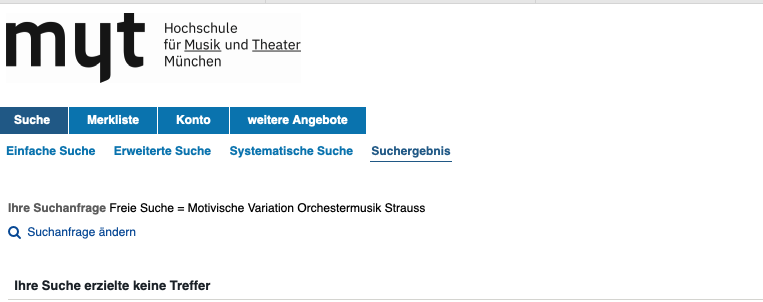
At first, however, the search does not lead to any results. So let’s take another look at the bibliographic information of the literature title. “Bibliogr. Zusammenhang” reveals that this is an article in an edited volume (in this case a Festschrift), i.e. an independent publication. If we search the OPAC for the title of the independent Festschrift (e.g. by entering “Compositionswissenschaft Festschrift Schlötterer”), the search is successful and we can borrow the publication by clicking “Bestellen” (= order).
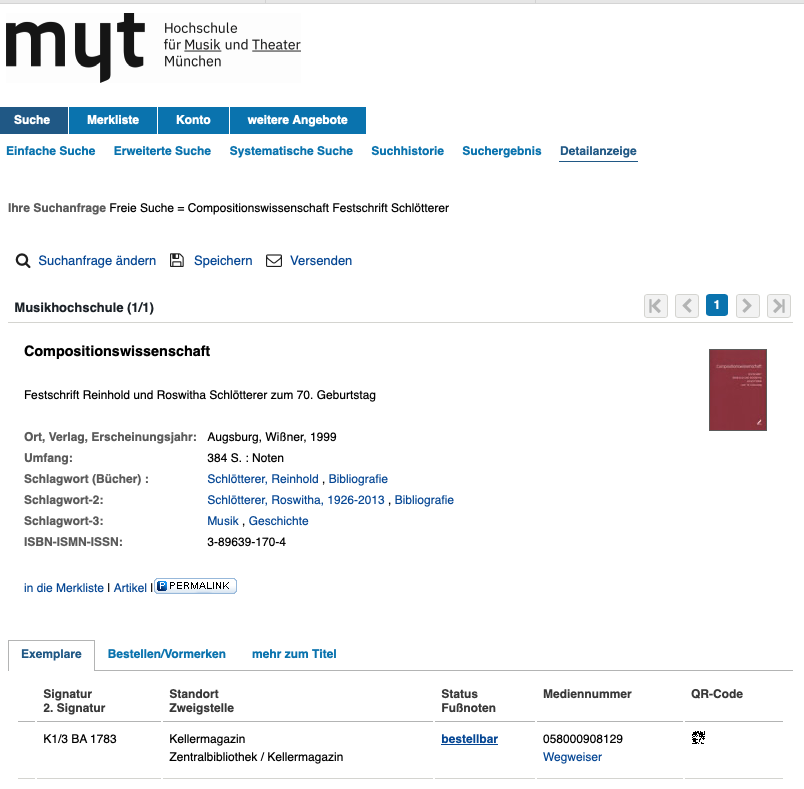
If a library OPAC only lists independent publications, but not articles in journals, chapters in edited volumes, etc., it is not possible to search for non-independent publications. However, this does not automatically mean that they are not available in the library!
If the literature you seek is not available in your own university library, it is advisable to search in other libraries e.g. the Bavarian State Library or the City Library (Stadtbibliothek). If the literature is not available there either, you may consider an interlibrary loan. The library staff will be happy to help.
Of course, library OPACs can also be used for research in addition to the databases in step 1. However, only the literature entered into the catalog will be listed.
Once the literature has been obtained, it can now be systematically evaluated in the next step (see next lesson). If necessary, the research steps should be repeated at a later point in the writing process, for example if new aspects of the research topic emerge or the research question is modified.
Advanced search techniques
So far, we have only dealt with the simple search, where search terms are entered into one search field. Library catalogs usually also offer an advanced search with additional search options.
The HMTM’s OPAC, for example, allows you to combine search terms in different fields – such as “Richard Strauss” in the “Personen” (= Persons) field and “Zarathustra” in the “Titel” (= Title) field. It is also possible to limit the search to specific media (sheet music, CDs, books, journals, etc.).
Another way of making searches more efficient is truncation (Latin for "to cut off"). Here, special characters take on the function of placeholders for one or more letters. These special characters can vary from library to library. The HMTM OPAC offers two very helpful options:
- A question mark replaces a letter at the end of the word ("Oper?" includes the search for terms such as Oper, Opern, Opera, Opere, etc.)
- An asterisk replaces several letters at the beginning or end of the word ("Oper*" includes the search for terms such as Opern, Opernsängerin, Opernhaus, Operas, etc.)
A final option is using Boolean Operators. The words (AND, OR, NOT) are used in the “simple search” field to combine two search terms in different ways. The following overview shows the effect of the operators. Publications are found in the area marked in gray:
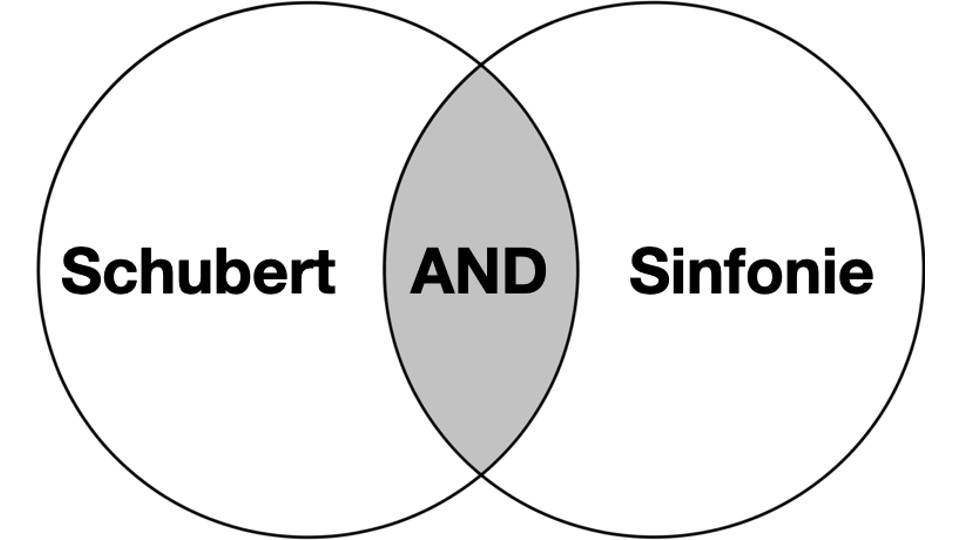
Diese Suche listet alle Einträge auf, die sowohl den Begriff "Schubert" als auch "Sinfonie" enthalten.
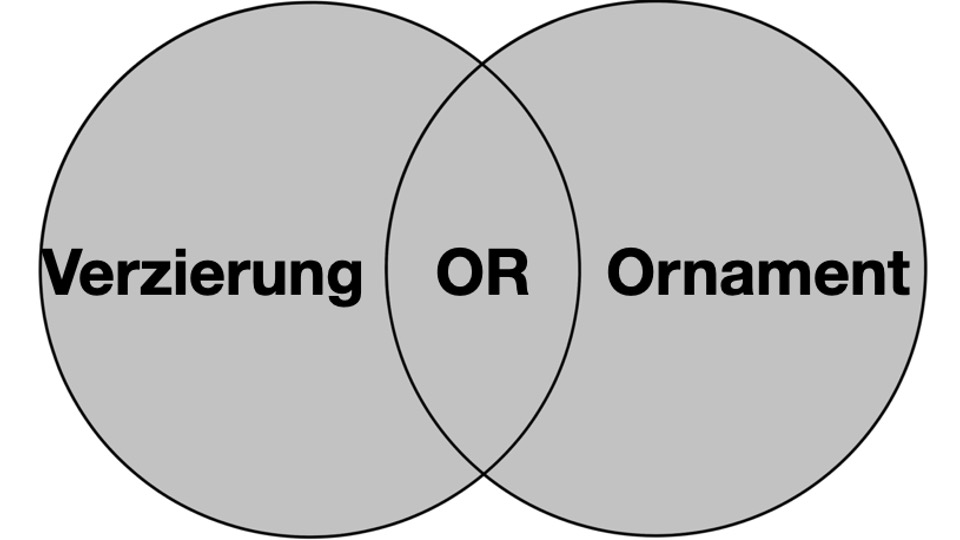
Diese Suche listet alle Einträge auf, in denen entweder der Begriff "Verzierung" oder der Begriff "Ornament" enthalten ist.
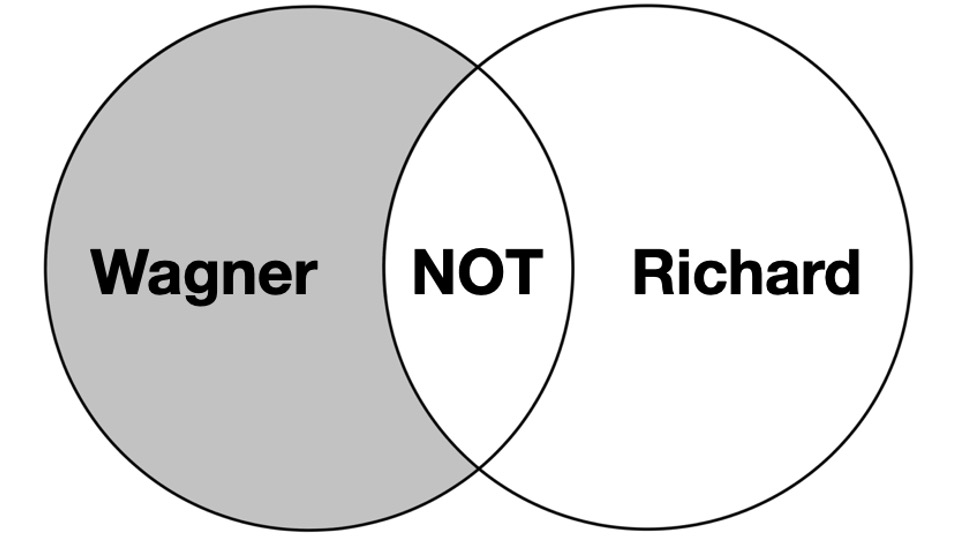
Diese Suche findet Literatur, in der nur der erste, nicht aber der zweite Begriff vorkommt. Dies könnte hilfreich sein, wenn man z.B. nur nach Einträgen zu Richard Wagners Sohn Siegfried sucht.
On this page, the HMTM library offers assistance in using the OPAC.
The Bavarian State Library also offers a whole series of tutorials and introductions on the subject of research and library use.
Further information on the topic of research can be found at:
- Matthew Gardner and Sara Springfeld, Musikwissenschaftliches Arbeiten: eine Einführung, 2nd edition (Kassel: Bärenreiter, 2018), 145–216.



